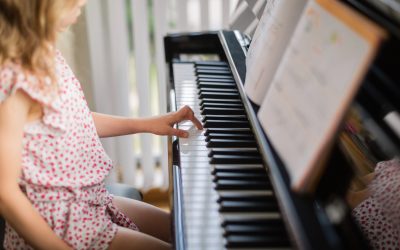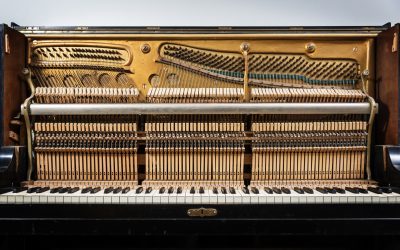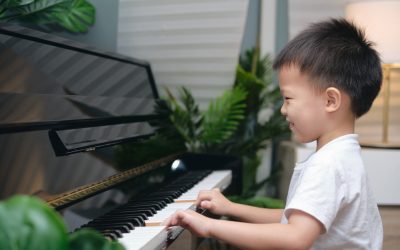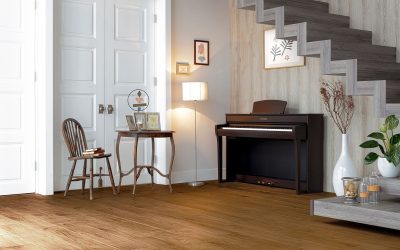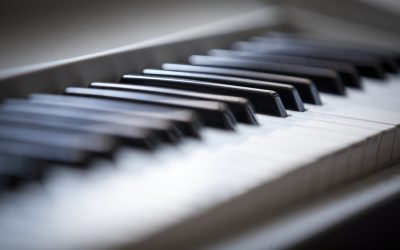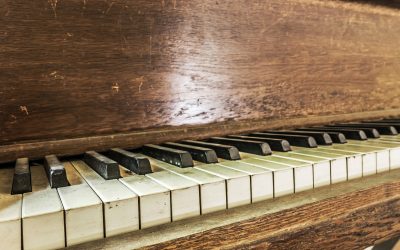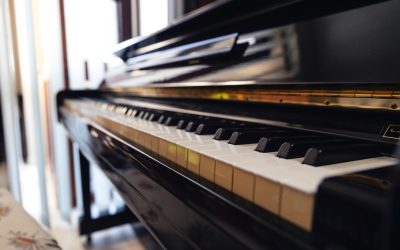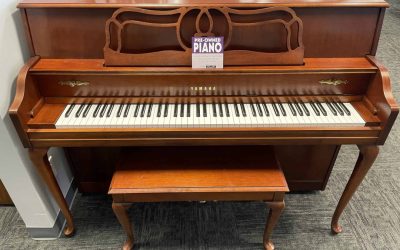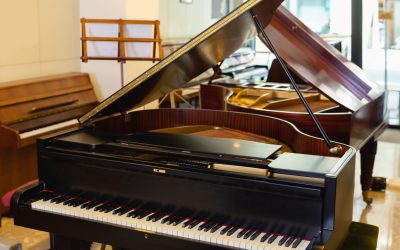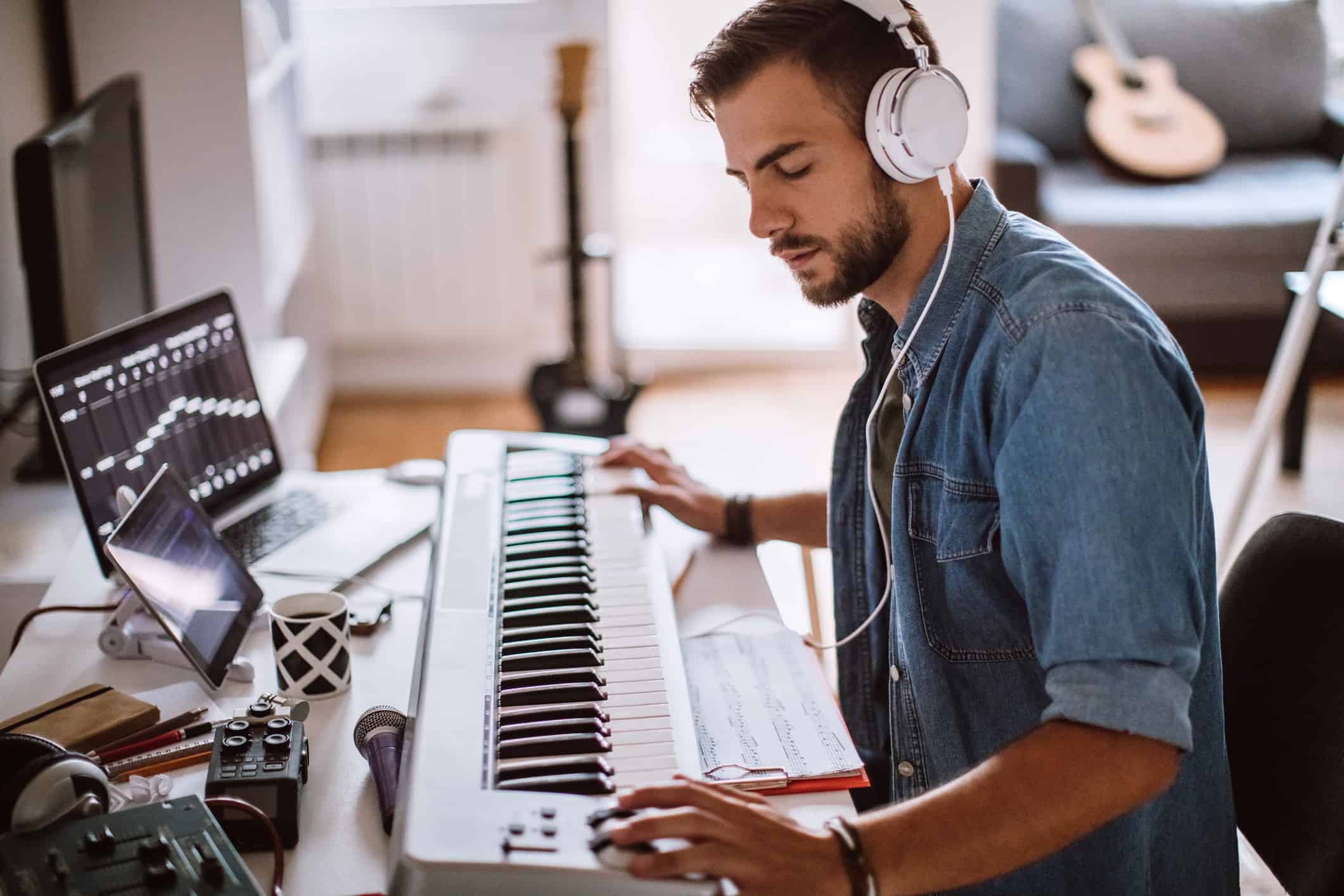
If you’re new to the world of music or considering an upgrade from your current instrument, you might be wondering about the differences between a keyboard and a digital piano. While both instruments share similarities, they also have distinct characteristics that cater to different musical needs and preferences. In this blog post, we’ll explore these differences to help you make an informed decision.
Is a Digital Piano Different from a Keyboard?
A digital piano and a keyboard are distinct musical instruments, each tailored to different musical needs. A digital piano is designed to closely mimic the sound and feel of an acoustic piano. It typically features high-quality piano samples and weighted or graded hammer-action keys, providing an authentic piano-playing experience. Digital pianos prioritize delivering a realistic piano sound and touch, making them ideal for pianists who want to learn, practice, perform, or compose music on the piano.
Conversely, a keyboard is a versatile instrument known for its wide range of sounds and features. While some keyboards can emulate piano sounds, they often prioritize flexibility, offering various instrument sounds, rhythms, and effects. Keyboards are suitable for musicians exploring different musical genres and styles and are favored by beginners, hobbyists, and professionals alike due to their portability and adaptability to various musical contexts.
Differences Between a Digital Piano and a Keyboard
Digital pianos and keyboards differ in their manufacturing and uses. Digital pianos are meant to emulate and enhance the experience of using a high-quality acoustic piano, while a keyboard is used for portability and, often, a greater diversity in sound and effects.
1. Sound Quality and Authenticity
One of the most significant differences between a keyboard and a digital piano is the sound quality and authenticity. Digital pianos are designed to closely replicate the sound of an acoustic piano. They often use advanced sampling technology to capture the nuances of a grand piano, including the variations in tone and dynamics. This results in a more authentic and expressive piano sound.
This is most pronounced in high-quality digital pianos such as the Yamaha Clavinova CVP-805, which features nuanced sound sampling from two of the top concert grand pianos worldwide, the Yamaha CFX and Bösendorfer Imperial. Digital pianos will also offer additional instrument sounds, and in higher quality digital pianos, these sounds will have phenomenally detailed nuances such as breath sounds in wind instruments.
Keyboards, on the other hand, prioritize versatility and portability over sound authenticity. While they can produce piano sounds, they put just as equal a focus on additional instrument sounds, including synthesizers, strings, and more. The piano sound on a keyboard may not be as rich or realistic as that of a digital piano.
2. Key Action
Key action refers to how the keys on the instrument respond to touch and how closely they mimic the feel of an acoustic piano. Modern digital pianos are designed with weighted or semi-weighted keys to replicate the resistance and feel of traditional piano keys. Technologies such as the Yamaha GrandTouch™ Keyboard with 88-key linear graded hammers have such a realistic touch and feel that pianists can play with the same nuanced expression as with a high-quality grand piano.
Keyboards usually have non-weighted or semi-weighted keys that are easier to play quickly but lack the authentic piano touch. For pianists looking for a piano-like feel, a digital piano is the better choice.
3. Number of Keys
Another significant difference between digital pianos and keyboards is the number of keys. Digital pianos typically have a full 88-key keyboard, matching the standard size of an acoustic piano. This is essential for those who want to practice classical piano pieces or develop their piano skills.
Keyboards come in various sizes, but many have fewer than 88 keys, making them more compact and portable. This is ideal for musicians who need a versatile instrument for live performances, studio work, or music production.
4. Portability
Portability is a key consideration when choosing between a keyboard and a digital piano. Keyboards are generally lighter and more compact, making them easy to transport and suitable for musicians on the go. They are a popular choice for gigging musicians and those with limited space at home.
Digital pianos, while still movable, are heavier and bulkier due to their authentic piano-like design. They are better suited for stationary use in a home, apartment, or studio environment.
5. Price
Price is often a deciding factor for many musicians. Keyboards tend to be more affordable than digital pianos, making them a budget-friendly option for beginners or those with limited funds. Digital pianos, with their higher-quality sound and key action, are usually more expensive but offer a more authentic piano-playing experience.
Final Thoughts
Choosing between a keyboard and a digital piano ultimately depends on your musical goals, preferences, and budget. For pianists looking for an instrument that closely replicates the look, feel, and sound of an acoustic piano, a digital piano provides a much better replication of these qualities than a keyboard does. On the other hand, for versatility, portability, and affordability, a keyboard might be a better fit.
You may also be interested in...
Encouraging Yourself to Play Piano More as an Adult
Playing the piano is rewarding, not only for the relaxation it provides, but also for the sense of accomplishment, confidence, and stress release if offers. However, for many adults, it can feel frivolous to take the time to play the piano. With so many other...
How to Keep Your Child Motivated to Practice the Piano
You picked the perfect piano, hired a highly-rated piano teacher, and bought your child a stack of books to learn how to play the piano—but one thing’s missing: their motivation to practice. Even if a child is super excited to learn to play the piano, there are some...
Top Health Benefits of Playing the Piano
There are many reasons people choose to play the piano—for pleasure, skill development, stress relief, and more. In this article, we explore the health and wellness benefits of playing the piano. How Playing the Piano Supports Health & Wellness Playing the piano...
Upright vs. Grand Pianos: Differences & Benefits
The choice between an upright or grand piano usually comes down to size, price, aesthetic, or all three. However, for those piano buyers who have wiggle room (literally and figuratively) in choosing a piano, the conversation about the difference between an upright and...
Yamaha U Series Upright Pianos
Yamaha is a world-renowned name in pianos because of their quality, reliability, and beauty. With a rich history of piano craftsmanship beginning in 1887, the heritage of Yamaha has made it one of the most respected names in the industry. About Yamaha’s U Series...
Yamaha Clavinova Digital Pianos: A Complete Guide
The Yamaha Clavinova is a world-renowned digital piano manufactured to emulate the touch, feel, and expression of an acoustic grand piano while offering a wide range of additional features, technology, and capabilities. In this article, we answer some of the most...
Ideas for Planning an Engaging Piano Recital
Piano recitals, especially for younger students, often have a reputation of being a little blasé. However, with the right preparation and innovation, a piano recital can be a captivating, elevated experience for its attendees. 10 Tips for a More Engaging Piano Recital...
How Digital Pianos Can Enhance Music Education
For new or experienced piano students, a digital piano can be an exceptional tool for enhancing music education. This is especially true for new or young piano students. In our blog “Best Pianos for Beginners,” we further discuss this fact as we discuss our choice of...
How to Clean and Maintain Your Yamaha Clavinova
While Yamaha Clavinova digital pianos require less maintenance than digital pianos as they don’t require annual tuning, regular cleaning and maintenance can help extend the life and performance of a Clavinova. In this step-by-step guide, we walk you through the...
About Free Pianos: What to Know Before Accepting a Free Piano
If you are in the market for a pre-owned piano, you may have seen many classified ads for pianos people are giving away for free. But why are there so many free pianos and should you be wary of accepting a free piano from a friend, family member, or neighbor? Why Are...
Is Having a Piano in the Home Good for Kids?
We already know that there are several benefits to kids for learning to play the piano, but what about just having a piano in the home? For children who are still too young to play the piano or for those who have chosen to pursue other passions, there are still...
How to Encourage Piano Playing in Your Home
Every once in a while we encounter someone who would love to buy a new piano for their home–but is worried it won’t get played often enough to make the purchase worth it. In this article, we discuss some of our favorite tips for encouraging piano playing in your home....
How to Spot a Quality Piano: A Beginner’s Guide
If you’re looking to buy a piano, whether new or used, you may be wondering how to ensure your purchase is of good quality. After all, purchasing a piano can be a significant investment, depending on whether you’re purchasing a beginner piano or an advanced piano, and...
Used Yamaha Pianos: What to Know
Used Yamaha pianos are among the fastest-selling brands of used pianos. Because of their material and manufacturing quality as well as global brand recognition, Yamaha pianos are preferred by individuals looking for a used piano they can rely on. Yamaha Pianos Their...
Why Buy a Used Piano?
If you’re interested in purchasing a new piano, you may be considering the benefits of a used piano compared to a new piano. Used pianos can be a tricky purchase if you don’t know what you’re looking for, especially if you’re buying from a private party that may not...

